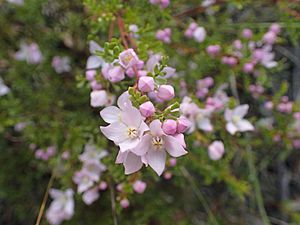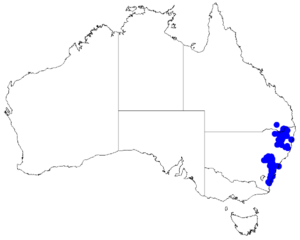Small-leaved boronia facts for kids
Quick facts for kids Small-leaved boronia |
|
|---|---|
 |
|
| Boronia microphylla leaves and flowers | |
| Scientific classification |
|
| Kingdom: | Plantae |
| Clade: | Tracheophytes |
| Clade: | Angiosperms |
| Clade: | Eudicots |
| Clade: | Rosids |
| Order: | Sapindales |
| Family: | Rutaceae |
| Genus: | Boronia |
| Species: |
B. microphylla
|
| Binomial name | |
| Boronia microphylla Sieber ex Rchb.
|
|
 |
|
| Occurrence data from Australasian Virtual Herbarium | |
| Script error: The function "autoWithCaption" does not exist. | |
Script error: No such module "Check for conflicting parameters".
Boronia microphylla, also known as the small-leaved boronia, is a pretty plant found only in eastern Australia. It belongs to the citrus family called Rutaceae. This plant is a type of shrub with special leaves that look like feathers, made up of many tiny leaflets. It also has lovely pink flowers with four petals.
Contents
About the Small-leaved Boronia Plant
The small-leaved boronia is a shrub that usually grows between 0.3 and 1.0 meter (about 1 to 3 feet) tall. Its newest branches have small, bumpy spots called glands. They also have a few stiff, bristly hairs.
Leaves of the Small-leaved Boronia
This plant has pinnate leaves. This means each leaf looks like a feather, with smaller parts called leaflets arranged along a central stem. There are usually 5 to 15 leaflets on each leaf's central stem, which is about 3 to 16 millimeters (0.1 to 0.6 inches) long. The leaf stalk, called a petiole, is 2 to 8 millimeters (0.08 to 0.3 inches) long.
The leaflets themselves are shaped like a spatula or a wedge. They are small, about 3 to 8 millimeters (0.1 to 0.3 inches) long and 1 to 4 millimeters (0.04 to 0.2 inches) wide. They are also smooth, meaning they have no hairs.
Flowers of the Small-leaved Boronia
The flowers of this plant are pink to purplish. They usually grow in groups of up to five. These groups are found mostly where the upper leaves meet the stem, which is called the leaf axil. Each group of flowers grows on a stalk that is about 3 to 10 millimeters (0.1 to 0.4 inches) long.
Each flower has four petals that are 5 to 8 millimeters (0.2 to 0.3 inches) long. These petals are also smooth and hairless. You can usually see this boronia flowering from October to February.
How the Small-leaved Boronia Got Its Name
The scientific name Boronia microphylla was first officially written down in 1825. This was done by a scientist named Franz Sieber. The description was then published in a book by Ludwig Reichenbach.
The second part of the name, microphylla, helps us understand something about the plant. It comes from two old Ancient Greek words. Mikros means "little," and phyllon means "leaf." So, microphylla means "small-leaved," which perfectly describes this plant!
Where the Small-leaved Boronia Lives
This type of boronia grows in different kinds of places. You can find it in open areas with shrubs, called heath, and also in forests. It grows along the coast, starting from a town called Moruya in New South Wales. Its range extends north into Queensland, near a town called Stanthorpe. You can also find it further inland, sometimes as far as the Great Dividing Range.
Growing Small-leaved Boronia in Gardens
Boronia plants can sometimes be tricky to grow in a garden. However, the small-leaved boronia is one of the tougher types. It can do well if it's planted in a spot that is protected from harsh weather. It also needs enough water to stay healthy.
The easiest way to grow new small-leaved boronia plants is by taking cuttings. This means taking a small piece of the plant and helping it grow roots to become a new plant.
Images for kids
-
Boronia microphylla in the Torrington State Conservation Area
-
B. microphylla in the ANBG
-
B. microphylla in the Gibraltar Range National Park
 | Janet Taylor Pickett |
 | Synthia Saint James |
 | Howardena Pindell |
 | Faith Ringgold |







